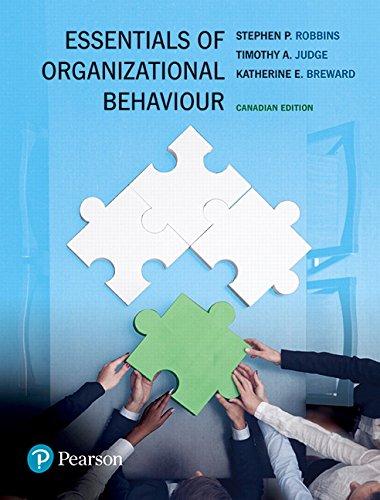Kaitlyn was in a difficult situation and didnt know what to do. Should she continue along her
Question:
Kaitlyn was in a difficult situation and didn’t know what to do. Should she continue along her current career path or make a change? She didn’t know the best way to balance her life and she felt so overwhelmed that it was hard to even think about the issue clearly. Kaitlyn looked back to how she had ended up in such a difficult place.
Kaitlyn had graduated six years earlier at the height of a recession.
Unable to find work in her field (psychology), she had taken the only job offered: answering phones in the call centre of a large software company.
Over time, she had worked her way up from customer service agent to telemarketer, then to inside sales. She received considerable support and training from her employer throughout her career ascent. Two years ago she had received her most recent promotion to field sales representative.
In that role Kaitlyn sold ERP database solutions to large companies.
She focused on new accounts within government. Deals generally took well over a year to close, but when they did her commission might easily exceed $10,000 for each individual deal. Her salary only barely kept her above the poverty line; but Kaitlyn was very good at her job, and her commissions were such that at the age of 27 she was earning $106,000 per year.
At first Kaitlyn loved the field sales role. She enjoyed the work itself; in fact she found field sales to be a lot like applied psychology, which fascinated her. She thought it glamorous to fly all over Canada and the United States to see clients. She often had the chance to indulge in tourist activities while on business trips. In just the past six weeks she had visited Mount St. Helens and the Calgary Stampede, and gone whale watching near Victoria.
She also really enjoyed her income, which she knew would be difficult to replace in any other job. Of course, that income was never guaranteed;
and if she had a few slow months even making the rent was a challenge.
She worried about that often, but somehow she always managed to get by, even if she had to temporarily ring up credit card debts to do it.
After just over two years, however, Kaitlyn’s perspective began to change.
She had four slow months in a row. Her boss now looked at her differently; she felt like he was watching her every move rather than trusting her to do her job. Her overall performance was good enough that she survived a major layoff in the department, but knowing future layoffs could be in the works was a source of ongoing anxiety.
Her three weeks of travel every month now seemed exhausting, not glamorous. She was tired of always eating out alone, and harassment from males also travelling solo was common in hotel restaurants so that she seldom felt safe exploring cities on her own after dark; so she ate a lot of fast food alone in her room.
It was hard to stick to an exercise regime with all the travel, and she had gained an unhealthy amount of weight. She never felt 100 percent well.
She had recurring bouts of acid indigestion and sometimes fell into what she described as a “black funk” for several days, calling in sick and staying in bed watching reruns of 70s TV shows.
Even worse, since she was away so frequently her friends and family had stopped inviting her to events. They always assumed she would be unavailable. Her frequent absences also made it challenging to date. Her time at home was spent going by herself to spas, yoga classes, and any other stress-relieving events she could find. Despite these efforts she often felt slightly anxious and had trouble sleeping.
When Kaitlyn was actually with a customer and was “on” she still felt great. She still enjoyed applying psychological principles to make sales.
She felt exhilarated whenever a deal closed, and proud that she could hold her own in a room full of C-suite executives and high-level decision makers. But everything seemed harder now. Before, being “on” came naturally; now it was work. Kaitlyn didn’t know why, but it became harder and harder to relate to her client’s problems and needs, a critical competency in field sales.
Kaitlyn liked her job much of the time and really, really loved her fivefigure commission cheques, both for the money itself and because of what they said about her independence and ability to provide for herself.
That said, she was tired of travel, tired of always being in “sales mode,”
tired of quotas and pressure. She wondered if there was a way she could better manage stress to make this job easier. Perhaps her employer might make some adjustments? Or should she just look at starting a new career elsewhere?
Discussion Questions
1. What contributes to Kaitlyn’s stress? Of those contributing factors, which can she control and which does her employer control?
2. If she stays with this company, what might Kaitlyn do herself to better manage stress? What could her employer do?
3. What do you think would happen if Kaitlyn continued on her current course, unchanged? Explain your answer.
4. If you were Kaitlyn, what would you do next and why?
Step by Step Answer:

Essentials Of Organizational Behaviour
ISBN: 9780134182971
1st Canadian Edition
Authors: Stephen P. Robbins, Timothy A. Judge, Katherine Breward





